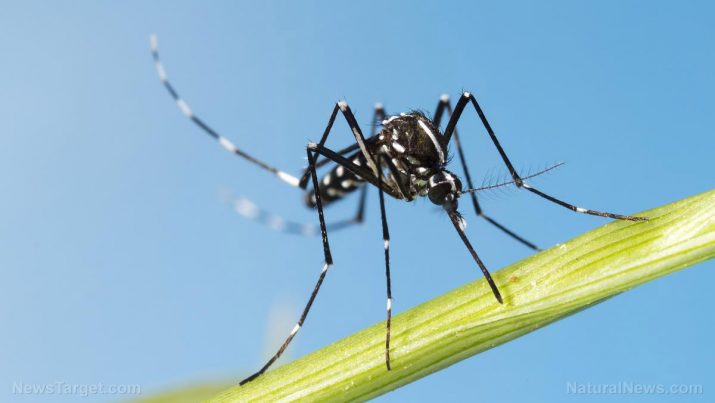
GM nightmare unfolds: Humans have created a MONSTER MOSQUITO that can now RESIST the pesticides meant to kill them
Saturday, January 06, 2018 by Isabelle Z.
http://www.realsciencenews.com/2018-01-06-gm-nightmare-humans-created-monster-mosquito-resist-pesticides.html

Getting bit by mosquitoes is never fun, and it can be downright deadly if they happen to be carrying diseases like malaria. Mankind’s quest to keep this nuisance under control, however well-meaning it may be, appears to have had the opposite of its intended effect as a new study shows how mosquitoes have evolved a type of genetic shield to protect themselves from chemical pesticides.
In an article published in Trends in Parasitology, researchers from University of California, Riverside, review the interesting genetic changes that have given the Anopheles mosquitoes that spread malaria to humans a new brand of pesticide resistance. Their findings show how human interventions have sparked an evolutionary response that allows them to resist the very pesticides that were designed to keep them at bay.
The authors explain how mosquitoes have found ways to adapt to exposure to insecticides. Some advantageous mutations in insecticide target sites are big sources of resistance, which illustrates the direct impact that human interventions have had on mosquito genomes. Other mutations are increasing enzyme activity that sequesters or degrades insecticide before it makes its way to its target within the cell. In other cases, the mosquitoes are even changing their typical behaviors in order to prevent themselves from coming into contact with the pesticides in the first place.
Researcher Colince Kamdem wrote: “These changes are occurring at the molecular, physiological and behavioral level, and multiple changes are often happening at the same time. With the accessibility of DNA sequencing we can now pinpoint these evolutionary changes at the genomic level.”
According to Kamdem, the high level of genetic diversity between the different species of mosquitoes and their ability to swap their genes is making it very difficult to prevent insecticide-resistant groups from forming. While new systems are being developed – such as those that kill mosquitoes with genetic approaches, stop them from breeding or prevent them from transmitting the parasite responsible for malaria – experts are worried that the mosquitoes will simply develop resistance to these methods as well.
Insecticide resistance on the rise
According to the World Health Organization, the gains seen in malaria prevention in recent years are under threat from growing insecticide resistance that could ultimately lead to a significant rise in malaria cases and deaths. They’ve called on the global malaria community to act urgently to keep insecticide resistance under control. 212 million people a year are infected with malaria, and children are at particular risk of dying from it.
Since 2010, 61 countries have reported mosquitoes developing resistance to one or more insecticide class, and 50 of those countries reports mosquitoes developing resistance to two or more classes. The problem could actually be worse than the statistics indicate as many countries are not reporting their data quickly or are failing to monitor for insecticide resistance on a routine basis.
Drug resistance making the problem even worse
The news comes at a bad time as scientists have recently been warning of a “supermalaria” parasite that is quickly spreading throughout Southeast Asia and will pose a worldwide health threat if it makes its way to Africa. This parasite is resistant to the most common first-line malaria treatment, artemisinin. With 438,000 malaria deaths around the world in 2015, it’s frightening to think of what kind of mortality figures this super malaria could cause.
Sources include:
Tagged Under: Tags: bad science, badpollution, badscience, Ecology, Evolution, failed science, genetic lunacy, genetic pollution, genome, GM mosquito, GMO, insecticide, insecticide resistance, Malaria, mosquitoes, science clowns, supermalaria, supermosquitoes





